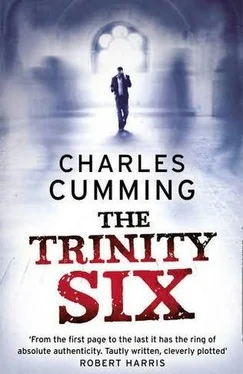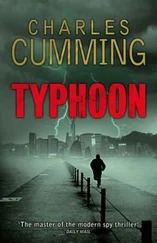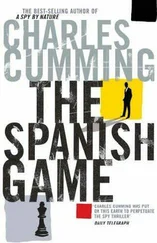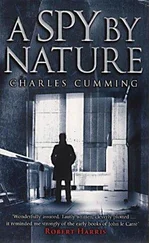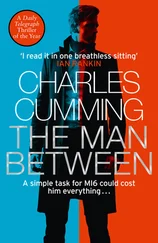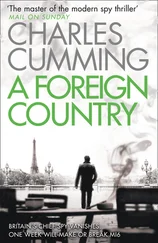Charles Cumming - The Trinity Six
Здесь есть возможность читать онлайн «Charles Cumming - The Trinity Six» — ознакомительный отрывок электронной книги совершенно бесплатно, а после прочтения отрывка купить полную версию. В некоторых случаях можно слушать аудио, скачать через торрент в формате fb2 и присутствует краткое содержание. Жанр: Шпионский детектив, на английском языке. Описание произведения, (предисловие) а так же отзывы посетителей доступны на портале библиотеки ЛибКат.
- Название:The Trinity Six
- Автор:
- Жанр:
- Год:неизвестен
- ISBN:нет данных
- Рейтинг книги:5 / 5. Голосов: 1
-
Избранное:Добавить в избранное
- Отзывы:
-
Ваша оценка:
- 100
- 1
- 2
- 3
- 4
- 5
The Trinity Six: краткое содержание, описание и аннотация
Предлагаем к чтению аннотацию, описание, краткое содержание или предисловие (зависит от того, что написал сам автор книги «The Trinity Six»). Если вы не нашли необходимую информацию о книге — напишите в комментариях, мы постараемся отыскать её.
The Trinity Six — читать онлайн ознакомительный отрывок
Ниже представлен текст книги, разбитый по страницам. Система сохранения места последней прочитанной страницы, позволяет с удобством читать онлайн бесплатно книгу «The Trinity Six», без необходимости каждый раз заново искать на чём Вы остановились. Поставьте закладку, и сможете в любой момент перейти на страницу, на которой закончили чтение.
Интервал:
Закладка:
Gaddis put his hand on Paul’s shoulder.
‘You were absolutely right about that. I just wanted to tell you that what you said has been a great support to me.’
‘I’m glad.’
‘And I thought about what you were doing in her office. I tried to imagine what Charlotte would have made of it.’ Gaddis began to respond but Paul interrupted him. ‘I think she would have done the same thing. Or, at least, I think she would have understood why you were there. You wanted to go into her office to see where she had been that morning, to get close to her, as you said at the time. You found yourself reminded of Edward Crane, you became distracted by the possibility of looking at her research. It was a long day. You were tired.’
‘I was snooping,’ Gaddis replied bluntly. He was touched that Paul had tried to find a way of forgiving him, but didn’t want to be let off the hook. ‘I was saying goodbye to the Cambridge book. I knew it was over and I was feeling sorry for myself.’
‘What do you mean you knew it was over? Why?’
The reply to the question seemed so obvious that Gaddis did not bother making it. Paul went to the oven and checked the lasagne. He seemed more at ease than he had been two days earlier; his privacy had been restored. He had the luxury of being alone with his grief. Turning, he said: ‘Why don’t you keep going? Why don’t you take a look at Charlotte’s research and try to work it up into a book?’
Gaddis could think of nothing to say. Paul saw his confused reaction and tried to convince him.
‘I don’t want her efforts to go to waste. She’d agreed to write a book with you. She would have wanted you to continue.’
‘Paul, I’m not an investigative journalist, I’m an archives man.’
‘What’s the difference? You interview people, don’t you? You can follow a trail from A to B. You know how to use a telephone, the Internet, a public library? How hard can it be?’
Gaddis was taking a packet of cigarettes from his jacket but it was just a reflex and he quickly replaced them, fearful of seeming tactless.
‘Go ahead and smoke.’
‘I’m fine. I’m going to quit.’
‘Listen’ — Paul switched off the oven, took out the food — ‘I won’t take “no” for an answer. Next time you have a free afternoon, come up to the house. Have a look through Charlotte’s research and see what you make of it. If you think she was on to something, if you think you can track down this Cambridge spy, write the book and put Charlotte’s name alongside yours.’ He made an uncharacteristically extravagant gesture with his hand. ‘You have my blessing, Doctor. Go forth.’
Chapter 7
As it turned out, Gaddis didn’t need much persuading. A letter had arrived from his accountant flagging up the outstanding tax bill. At the weekend, he had sat through a telephone conversation with Natasha, who was worried that Min would have to drop out of school altogether if the fees weren’t paid by Christmas. Needing to secure an advance as quickly as possible, he had no choice but to set to work on the Cambridge book and to put together a proposal for Paterson.
Paul had left a set of keys at a newsagent in Hampstead. Gaddis let himself into the house late on Monday morning. He made a cup of coffee in the kitchen, found Charlotte’s laptop, and walked out to the garden. He went to the shed and closed the door behind him. There was a cobweb in the apex of the roof and he felt that he could still catch the faint smell of Charlotte’s perfume, a thing which unsettled him. A biro mark was scrawled down one wall, torn newspaper cuttings and postcards pinned to a mottled corkboard which looked as if it had succumbed to a bout of woodworm.
Sitting down, his arms braced on the desk in front of him, he experienced an acute sense of trespass, and wondered if he should just stand up and walk away from the whole thing. Was he honouring Charlotte’s memory or just making a fast buck?
A bit of both, he admitted to himself. A bit of both.
He opened the laptop and powered it up, attaching the flex to a socket in the wall. He did the same with her mobile phone, realizing at once that there would be text messages and voicemails from friends and colleagues who had not yet learned of Charlotte’s death. Sure enough, the phone beeped repeatedly as it powered up, three texts from people whose names he did not recognize. He took down the numbers on a scrap of newspaper and knew that, before the day was out, he would have to phone them and tell them that Charlotte Berg had passed away.
There were so many files, so many folders and photographs on the computer’s desktop that Sam was at first overwhelmed. Where to begin? He thought of his own computer at UCL, of the thousands of emails and essays, research notes and photographs which, if accessed, would built up to an almost total picture of his personal and professional life. How does a person begin to pick his way through that?
He double-clicked all of the documents on her desktop, one by one, moving across the field of files, none of which appeared to relate to the Cambridge investigation. To simplify things, he ran a hard drive search for ‘Edward Crane’ and ‘Thomas Neame’, but the results were meaningless. He tried ‘Philby’, ‘Blunt’, ‘Maclean’, ‘Burgess’ and ‘Cairncross’, but again drew a blank. There was clearly no first draft of Charlotte’s story, no interview transcripts, no notes. It was as if they had been wiped away.
Towards midday, Gaddis became so frustrated that he sent Paul a text message with the question: Did C use a second computer? to which Paul replied: Not to my knowledge. None of her emails related to work on the story. Searches for ‘Cambridge’, ‘Neame’ and ‘Crane’ within Outlook also proved useless. He concluded that Charlotte must have been carrying around most of the research in her head.
Towards two o’clock, Gaddis found a small, alphabetized box of files, designed as a portable case, in the far corner of the office. He opened it and began to go through her private papers: bank statements; details of her pension plan; letters from accountants. All of it would have to be given to Paul, who had been left with the task of completing probate. Another box contained cuttings from newspaper and magazine articles which Charlotte had written, dating back to the early 1990s, a gone-away world of Clinton and Lewinsky, of Rwanda and Timothy McVeigh.
At last he discovered something which he was sure would start him on the path to Thomas Neame: a Sony digital recorder lodged in the inside pocket of a coat which Charlotte had left hanging behind the door of her office. Gaddis switched it on, but found only an old interview about Afghanistan. It was as if the Cambridge investigation had never taken place. Had she made a deliberate decision to write nothing down? What else could explain the complete absence of a paper trail?
By three o’clock, Gaddis was hungry and stir crazy. He took out an entire drawer from her desk and carried it into the kitchen, where he microwaved a supermarket Chilli con Carne and ate it while picking through the contents. The drawer was awash in gas bills, half-finished strips of paracetamol, cheque books and rubber bands. Chaos. He was reminded of Holly’s flat and sent her a text message to which she did not respond.
Finally, while mopping up the dregs of the chilli with a hunk of stale bread, he found an envelope of expenses receipts, dated within two months of Charlotte’s death. Gaddis pushed the plate to one side and poured the receipts, perhaps thirty or forty of them, on to the table. He might as well have been looking at grains of rice. How was a till receipt from WH Smith going to lead him to Edward Crane? He said to himself, in an audible whisper: ‘You’re an idiot’ and put the receipts back in the envelope. Then he found a beer in Paul’s fridge, drank it from the bottle and contemplated the possibility of going into the garden for a smoke. He had given up cigarettes twenty-four hours earlier. Was one more packet going to give him lung cancer? Would five quid break the bank? No.
Читать дальшеИнтервал:
Закладка:
Похожие книги на «The Trinity Six»
Представляем Вашему вниманию похожие книги на «The Trinity Six» списком для выбора. Мы отобрали схожую по названию и смыслу литературу в надежде предоставить читателям больше вариантов отыскать новые, интересные, ещё непрочитанные произведения.
Обсуждение, отзывы о книге «The Trinity Six» и просто собственные мнения читателей. Оставьте ваши комментарии, напишите, что Вы думаете о произведении, его смысле или главных героях. Укажите что конкретно понравилось, а что нет, и почему Вы так считаете.
